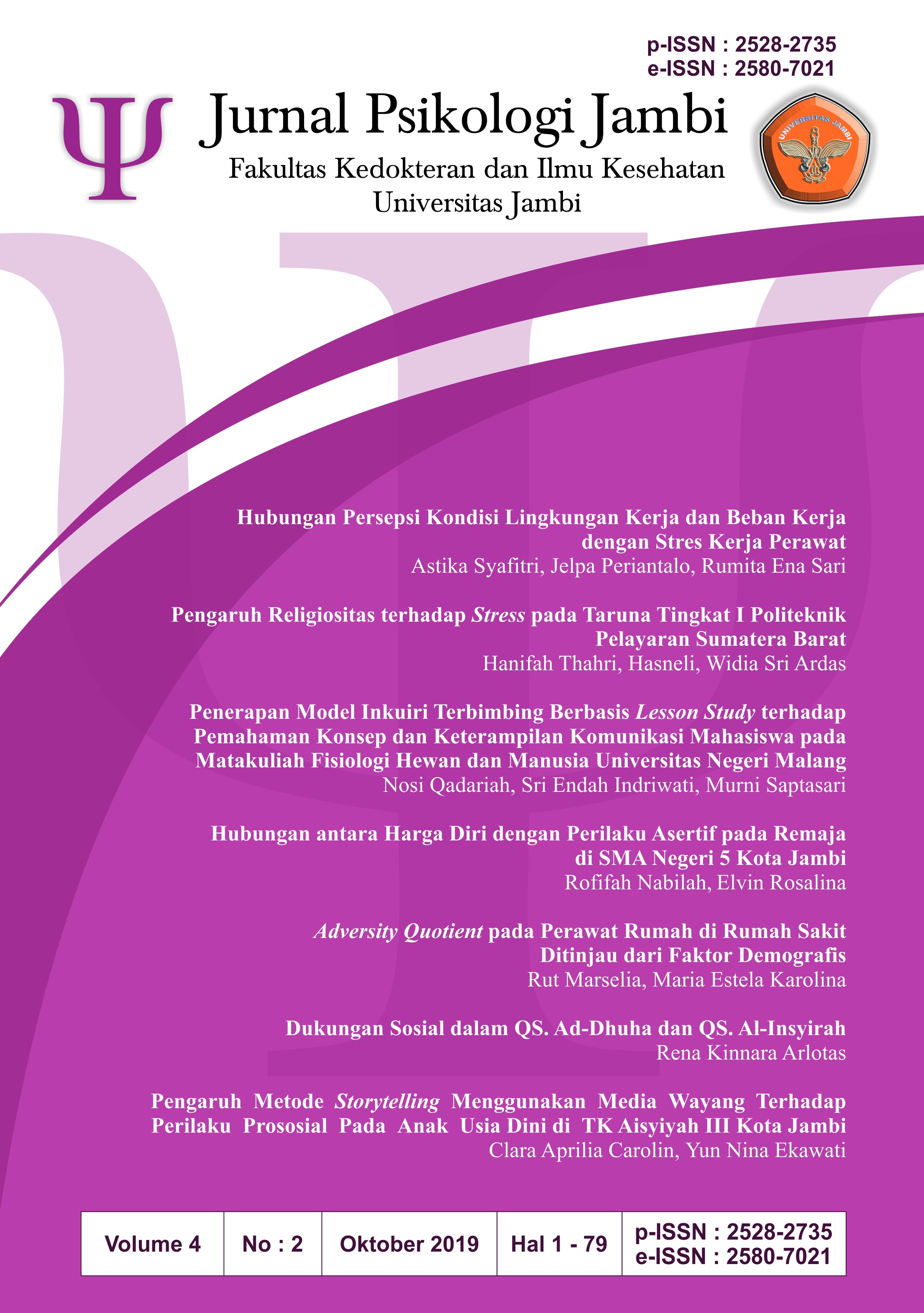DUKUNGAN SOSIAL DALAM QS. AD-DHUHA DAN QS. AL-INSYIRAH
SOCIAL SUPPORT IN QS. AD-DHUHA AND QS. AL-INSYIRAH
DOI:
https://doi.org/10.22437/jpj.v5i02.10337Abstract
Introduction Al-Quran is a guide to human life, include a balance between physical and mind, worship and self ability, relationships between people, and so on. Regarding guidance in human relations, the Koran has also given us instructions on how to provide social assistance for others who need it. This can be seen in QS. Ad-Dhuha and Al-Insyirah.
Objective This research supports to see how social support is contained in QS. Ad-Dhuha and Al-Insyirah.
The results of this research is social support contained in the QS. Ad-Dhuha and Al-Insyirah consist of emotional support, network support, esteem support, instrumental support, and information support. The benefits received by Rasulullah SAW after receiving this support are psychological well being, calm, and the burden becomes lighter. Rasulullah SAW also provides social support to others, especially orphans and beggar, and always give thanks to Allah SWT.
Recomendatian So, we always believe in Allah SWT, always be grateful for all the support and gifts that He has given and we also always provide social support for others.
Keyword: Social support, QS Ad-Dhuha, QS. AL-Insyirah
ABSTRAK
Pendahuluan Al-Quran adalah petunjuk hidup manusia yang meliputi keseimbangan antara lahir dan batin, ibadah dan kemampuan diri, hubungan antar manusia, dan sebagainya. Mengenai petunjuk dalam hubungan antar manusia, Al-Quran juga telah memberikan petunjuk bagi kita mengenai bagaimana memberikan dukungan sosial bagi orang lain yang membutuhkannya. Hal ini antara lain terlihat dalam QS. Ad-Dhuha dan Al-Insyirah.
Tujuan Penelitian ini bertujuan untuk melihat bagaimana dukungan sosial yang terkandung dalam QS. Ad-Dhuha dan Al-Insyirah.
Hasil Dari hasil penelitian diketahui bahwa dukungan sosial yang terkandung dalam QS. Ad-Dhuha dan Al-Insyirah adalah berupa dukungan emosional (emotional support), dukungan jaringan (network support), dukungan penghargaan (esteem support), dukungan instrumental (tangible aid), dan dukungan informasi (informational support). Manfaat yang dirasakan Rasulullah SAW setelah mendapat dukungan tersebut adalah meningkatnya psychological well being, hatinya menjadi tenang dan lapang, serta bebannya menjadi terasa lebih ringan. Rasulullah SAW juga disuruh untuk memberikan dukungan sosial kepada orang lain, khususnya anak yatim dan orang yang meminta minta, serta senantiasa bersyukur pada Allah SWT.
Saran Gambaran ini juga menjadi tuntunan bagi kita untuk selalu beriman kepada Allah SWT, senantiasa bersyukur atas segala dukungan dan karunia yang telah diberikan-Nya dan hendaknya kita juga senantiasa memberikan dukungan sosial bagi orang lain.
Kata Kunci: Dukungan sosial, QS Ad-Dhuha, QS. AL-Insyirah
Downloads
References
Adyani, L., Suzanna, E., Safuwan, S., & Muryali, M. (2019). Perceived Social Support And Psychological Well-Being Among Interstate Students At Malikussaleh University. Indigenous: Jurnal Ilmiah Psikologi, 3(2). 98-104 doi:https://doi.org/10.23917/ indigenous.v3i2.6591.
Blum, Kay., & Gottlieb S Stephen. (2007). Morbidity and Mortality Benefits of Reliable Instrumental Support. Journal of Cardiac Failure Vol. 13 No. 6 Suppl. 2007. Division of Cardiology, Cardiomyopathy and Pulmonary Hypertension, University of Maryland, Baltimore, MD.
Burleson, Kunkel. & Kunkel, Adrianne. (1996). The Socialization of Emotional Support Skills in Childhood. In Pierce Gregory, Sarason, Barbara., Sarason, Irwin. Handbook of Social suport and the family (pp.105-140. NY: Plenum Press.
Cutrona, C. E., & Suhr, J. A. (1994). Social support communication in the context of marriage: An analysis of couples' supportive interactions. In B. R. Burleson, T. L. Albrecht, & I. G. Sarason (Eds.), Communication of social support: Messages, interactions, relationships, and community (p. 113 135). Sage Publications, Inc.
Hermawan, I. (2019). Metodologi penelitian pendidikan kuantitatif, kualitatif dan mixed methode. Kuningan: Hidayatul Quran.
Holmstrom, A. J., Russell, J. C., & Clare, D. D. (2013). Esteem support messages received during the job search: A test of the CETESM. Communication Monographs, 80(2), 220–242. https://doi.org/10.1080/03637751.2013.775699.
Ko, Hsiu-Chia., Wang, Li-Ling., Xu, Yi-Ting. (2013). Understanding the Different Types of Social Support Offered by Audience to A-List Diary-Like and Informative Bloggers. CYBERPSYCHOLOGY, BEHAVIOR, AND SOCIAL NETWORKING Volume 16, Number 3, 2013 DOI: 10.1089/cyber.2012.0297.
Kumar, Rajesh., Lal, Roshan., Bhuchar, vivek. (2014). Impact of Social Support in Relation to Self Esteem and Aggression among Adolescents. International Journal of Scientific and Research Publications, Volume 4, Issue 12, December 2014 ISSN 2250-3153.
Morelli, Sylvia., Lee, Ihno A., Amn, Molly E., & Zaki, Jamil. (2015). Emotional and Instrumental Support Provision Interact to Predict Well-Being. Published in final edited form as:Emotion. Department of Psychology, Stanford University 2015 August ; 15(4): 484–493. doi:10.1037/emo0000084.
Quthb, S. (2000). Tafsir Fi Zhilalil Quran. Depok : Gema Insani.
Syaikh, A.I.M.A. (2013). Tafsir Ibnu Katsir. Jakarta: Pustaka Imam Syafi’i.
Zed, M. (2008). Metode penelitian kepustakaan. Jakarta: Yayasan Obor Indonesia.











